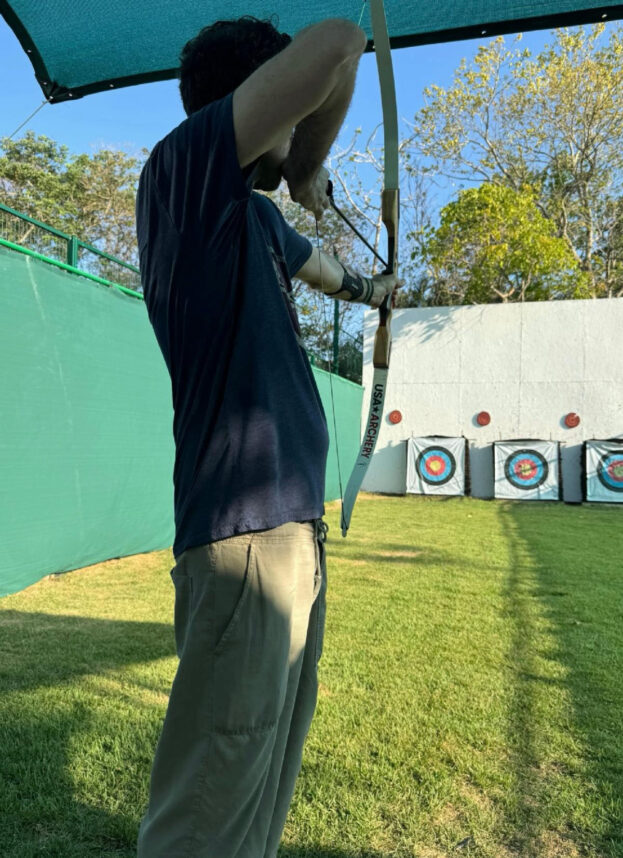 Tony Anderson/Getty Images
Tony Anderson/Getty Images As a teen in the late ’90s and early 2000s in Phoenix, Payam worked at AMC Theaters, first as a porter, tasked with removing trash from seats and quickly sweeping popcorn and candy from aisles before the next film began. Then, he moved his way up to the concession stand. Finally, he nabbed a coveted job at the ticket sales counter.
I had only one question for Payam about his self-described menial summer job: Was he provided disposable gloves with which to pick up trash from those movie theater seats?
“I don’t think so,” he recalled. “And it was actually a hard job because it was a lot of menial work and rushing around.” But Payam told me that he came home each day with more appreciation for his parents’ constant cleaning and tidying around the house. And more than ever, he understood the value of each dollar he made sweeping, ticketing or topping popcorn with imitation-butter.
In her late teens, Shadi, his younger sister, was a waitress at Cracker Barrel. If, like me, you had never heard of Cracker Barrel, it’s a restaurant chain that serves Southern comfort food. There was Phoenix’s local Cracker Barrel, with its meatloaf, mac and cheese and signature “Chicken N’ Dumplins,” and there was Shadi, with her olive skin, dark curls and mostly Persian diet that consisted of anything but “dumplins.”
“I worked at Subway for a year, Dairy Queen for a summer, Cracker Barrel for two years and Famous Dave’s for two years,” she told me. “Those jobs taught me a lot about customer service, the importance of tipping and how to multitask effectively, which is a very valuable skill in my current career.” Incidentally, today, Shadi is an emergency medicine physician.
As for me, I could devote a short book to my slew of fantastically underwhelming teen summer jobs in Los Angeles. There was the time I served as a Starbucks cashier and barista in Westwood Village the summer after high school in 2001. That job tested my physical limits; I used my body weight to push the world’s heaviest mop, burned my hands mildly almost every week on the temperamental milk steamer, and gained eight pounds that summer because I purposely prepared small Frappuccino samples (with lots of whipped cream) precisely when we had fewer customers, allowing me to consume most of them myself.
Despite having worked four jobs while in high school, I never fully understood the value of a dollar until I worked as a young barista. I paid for my own clothes, CDs and movie tickets with my slightly scalded fingers. I felt so accomplished. But to this day, I’m uncomfortable around milk steamers.
One of my other teen jobs was as a proofreader and paid intern during several summers at The Beverly Hills Courier, a local newspaper founded by the late March Schwartz in 1965. In 1998, I was paid $6 an hour, totaling a glorious $36 a day. I spent most of it at AMC Theaters in L.A., the same theater chain where, back in Phoenix, Payam was allegedly collecting theater refuse with his bare hands.
Aren’t lousy teen summer jobs the best?
I asked some friends about their menial teen summer jobs. One worked for a vending machine company, collecting quarters from the machines in Philly and South New Jersey. He and a friend were also tasked with carrying heavy pool tables and pinball machines up and down steps of bars. Things were going well until they dropped a pool table.
One friend spent time at a new dig site at the La Brea Tar Pits in the late 1960s. “I thought it would be interesting, but I was spending hours inspecting and re-inspecting dirt to look for tiny bones,” she told me. “I don’t think I found one all summer.”
Another friend worked at a bagel shop at age 15, but quit after two weeks because there was nowhere to sit, and after standing all day next to hot ovens in the summer heat, she felt faint. One friend worked as a cashier at a dry cleaner in 2002, earning $7 an hour. When I asked her if, in hindsight, she learned any important lessons from that job, she responded that it taught her “how to deal with irrational people. But it was really the backbone of what started my work ethic.”
My favorite anecdote came from a friend who once worked at a little hot dog cart in downtown LA and was made to wear a cap with a plastic hot dog on it. That cap, he told me, was the bane of his existence. But at the end of summer, he realized it was evidence of his ability to tolerate annoying realities. That, he said, made him feel “more proud” of himself than being accepted into UCLA.
I asked Suri Nowosiolski, LCSW, MSpEd. (Licensed Clinical Social Worker), who has spent nearly 30 years working with children and families, about the value of a menial summer job for teens. Nowosiolski, a therapist who is based in Sherman Oaks, runs Cognitive Connections Plus and told me that she’s seen “an overall increase in complaints of boredom and apathy” in youth. “Teens often lack a sense of belonging to something bigger than themselves,” she said. “They lack agency and a feeling that they matter and that what they do matters.”
A teen who’s bored, apathetic and sitting around all summer? Sounds like the perfect candidate for a menial summer job that will help build tolerance for boredom and resilience in non-optimal situations (think sweeping floors, doing tedious data entry or smiling at demanding customers).
Make no mistake: I’m not advocating for teens to suffer intolerable jobs, especially if they’re grueling, not accommodating for those with disabilities, or if teens are being somehow exploited at work. But isn’t experiencing an underwhelming summer job a rite of passage for most teenagers?
I wouldn’t be surprised if today, given the astronomical rise of influencers and others who seem to enjoy huge social and financial rewards for less tedious work, teens now believe that they don’t need summer jobs at all.
Perhaps it used to be. But I wouldn’t be surprised if today, given the astronomical rise of influencers and others who seem to enjoy huge social and financial rewards for less tedious work, teens now believe that they don’t need summer jobs at all. Who wants to pull a lever to serve soft serve ice cream all day if they believe they can become an overnight success as an influencer? (There’s nothing inherently bad about influencers, but, in my opinion, there’s also no replacement for the boredom tolerance that develops from handling that metaphorical soft serve lever for hours.)
Nowosiolski told me repeatedly that the value of having summer jobs allows teens to develop and strengthen their “distress tolerance skills,” adding that “engaging in a summer job that may be perceived as menial offers them real-life situations where they can practice managing discomfort, maintaining focus, and persisting through tasks they may find less engaging. By working through these experiences, teens can gradually enhance their ability to tolerate distress and remain focused on their goals.”
A teen who struggles to find meaning in what other peers value may find a lot of meaning, value and structure in a summer job, no matter how tedious. Summer jobs help teens with everything from strengthening interpersonal communication and social skills to learning how to solve problems and deal with all kinds of people.
Menial summer jobs offer teens a chance to “develop essential coping mechanisms, such as self-regulation and perseverance” in an environment that is controlled and supportive, said Nowosiolski. For example, a teen who may be struggling with a chaotic home life can experience order, normalcy and stability in a summer job (and can be out of the home more often). A teen who struggles to find meaning in what other peers value (think frivolous shopping or constant online gaming) may find a lot of meaning, value and structure in a summer job, no matter how tedious. Summer jobs help teens with everything from strengthening interpersonal communication and social skills to learning how to solve problems and deal with all kinds of people.
Nowosiolski has seen “an influx of teens with low self-esteem, social anxiety, and depression,” and these are often exacerbated by “avoidant tendencies, difficulty tolerating non-preferred (read: boring) activities and a tendency to ‘numb-out’ with social media and other screen-based activities.”
Given my lousy, but important summer jobs, I believe that if you’re going to “numb out,” you might as well be paid for it (even if it’s minimum wage).
Nowosiolski is especially known for helping kids cope with anxiety using evidence-based treatments. She told me that anxiety and depression among teenagers “have surged” in the aftermath of the COVID-19 pandemic. “The pandemic has created a challenging environment for their emotional well-being, clearly emphasizing the need for comprehensive support and resources to address the more serious mental health needs,” she said.
No one should expect a summer job to save a teenager, but experiencing the stability of a job that holds one accountable, offers new experiences and gives teens a chance to earn (and spend) their own money is part of a comprehensive, bigger picture.
The key word here is “comprehensive.” No one should expect a summer job to save a teenager, but experiencing the stability of a job that holds one accountable, offers new experiences and gives teens a chance to earn (and spend) their own money is part of a comprehensive, bigger picture: That bigger picture is the experience of growing up, of existing between two realms — not yet an adult, yet much more capable than a young child.
“As adults, we understand the importance of engaging in a variety of tasks throughout the day, even if they are not all enjoyable,” said Nowosiolski. “We recognize that in order to lead a productive and fulfilling life, we can’t treat daily activities like a multiple-choice question or an à la carte menu.”
She continued, “We acknowledge that the correct answer often lies in embracing ‘all of the above.’ This means learning to persist through less stimulating tasks like completing tax returns, paying bills, and doing laundry.” Simply put, that means that those of us who can weather through these less-than-ideal activities have, over time, honed our distress tolerance skills.
Naturally, I asked Nowosiolski if she had a lousy, but valuable summer job as a youth. “At 10 years old, I delivered newspapers using a little granny cart to lug them around, and then collected payment for them at the end of each week,” she said. “I learned to be organized, keep records, communicate with customers, bravely ask for payment and sit for hours as I totaled up what I collected and compared it to what I was supposed to have collected, without a calculator.” Despite her frustration, Nowosiolski felt something that’s precious for every youth: a sense of meaning and purpose. She understood that she provided an important service.
“Can we effectively manage our displeasure, boredom, or frustration to accomplish our goals?” she asked me regarding teen jobs. “Developing distress tolerance is a learnable skill, akin to strengthening a muscle. And one of the most effective ways to cultivate and reinforce this skill is through practice. What better opportunity for practice than a ‘menial’ summer job?”
Encourage your teens to get a summer job. Any job. At the very least, they’ll have some great stories to tell as adults. Just ask anyone who, as a teen, once swept movie theater floors, talked up “dumplins” to customers, tried to tame a milk steamer or wore a plastic hot dog on their head.
For more information about Suri Nowosiolski and Cognitive Connections Plus, visit www.surimsw.com
Tabby Refael is an award-winning writer, speaker and weekly columnist for The Jewish Journal of Greater Los Angeles. Follow her on Twitter and Instagram @TabbyRefael























 More news and opinions than at a Shabbat dinner, right in your inbox.
More news and opinions than at a Shabbat dinner, right in your inbox.